- Home
- Sue Grafton
V is for Vengeance Page 27
V is for Vengeance Read online
Page 27
I made a rolling gesture with one hand, hoping she’d get to the point. “Next thing I knew, someone knocked on my door.”
“Why am I thinking Uh-oh? Was this the courier?”
She shook her head. “He didn’t say so, but he implied he was. He said a package had been delivered erroneously and he’d come to pick it up.”
“Erroneously? He actually said that?”
“He did and it seemed like an odd choice of words. Aside from the fact he wasn’t wearing a uniform, I couldn’t see handing over all that cash to a man I’d never laid eyes on. It didn’t seem right.”
“So far, so good. I can’t wait to hear what you did.”
“I told him I didn’t have it. I said I notified the company a package was delivered to the wrong address and they picked it up half an hour before.”
“And he believed you?”
“I suppose. He didn’t seem happy, but there wasn’t much he could do.”
“Ah. So he didn’t know you’d opened it.”
“He might have. The box was sitting right there.”
I looked over at the dining room table, which was clearly visible from where I stood. She’d placed the lid upside down on the box to conceal the cash, but the wrapping paper was in plain sight. I crossed to the table and set the lid to one side. I stared at the money with the same admiration and disbelief she’d expressed on the phone. I nudged the brown paper wrapping, turning it over with the kitchen knife she’d used to cut the tape. The return address was a post office box in Santa Monica. I copied the number into my notebook and returned to a study of the cash. “How much do you think we’re looking at?”
“No telling, but I don’t think we should touch anything.”
“Hey, I’m with you. I don’t want my fingerprints showing up on this thing. Bad enough you handled the package before we knew what it was.”
The box was roughly twelve by twelve by twelve, packed with bundles of bills, the uppermost of which were hundreds.
Vivian said, “What do you think we should do?”
“Turn it over to the police.”
“And say what? Isn’t it against the law to intercept someone else’s mail?”
“Good point. It’s federal. I’ve done it lots of times but never netted anything like this. On the other hand, anyone who claimed the cash would have some serious explaining to do.”
“What about me? I can’t claim I just happened to come across it on Audrey’s porch, because the driver knows I signed for it and he put it in my hands.”
“You’ll just have to level with them.”
“I will? Why not you?”
“Look at the logic here. Audrey’s dead. You’re her landlady, so it’s not out of line for you to pick up her mail, especially when you know she was charged with a crime. Isn’t that why you took the package in the first place?”
“Sort of. It was an impulse—a bad one, as I’d be the first to admit.”
“You did them a service. The police can use the return address to trace the package back to its origin.”
“This is making me nervous. I still don’t see why you can’t take care of it.”
“Nope. Don’t think so,” I said.
I was already picturing myself showing up in Cheney Phillips’s office with the contraband cash, which was most assuredly connected to Audrey’s shoplifting, which meant that Len Priddy would be apprised of it, which meant I’d be subject to the scrutiny of a man who didn’t like me to begin with. At the same time, withholding evidence of this magnitude probably constituted a crime far worse than mail tampering.
“What other options do we have?” she asked.
“Beats the hell out of me,” I said. “Situations like this, it’s better to do what’s right and take the heat. I’m not going to haul the money home and hide it under my bed.”
“I don’t suppose you could handle it without bringing my name into it. I don’t want Rafe to find out.”
“Sorry.”
“Well, shit,” she said, which seemed so out of character I laughed.
We took my car since Rafe had taken theirs. The only compromise I could think of was to deliver the cash to the San Luis Obispo County Sheriff’s Department instead of the city police. This had certain built-in advantages. The sheriff’s department and the Santa Teresa Police Department were separate jurisdictions. With luck, it would take time for one law-enforcement agency to communicate with the other. I didn’t think there was any rivalry between the two, but there was probably a pecking order and the usual bureaucratic bullshit standing in the way. The longer it took for Len Priddy to get wind of the cash, the happier I’d be.
We said little on the drive over, each of us contemplating the possible repercussions—she from Rafe and I from Sergeant Priddy. We presented ourselves as model citizens, the equivalent of Good Samaritans turning in a wallet full of money found on the street. The deputy at the desk made a phone call and the matter was redirected to a Sergeant Detective Turner, who came out to the counter. We signed in and were given self-adhesive passes that we stuck to our shirts. He escorted us through the inner offices to his cubicle. Once seated, I launched into an explanation of how we’d come by the cash. Vivian nodded frequently but managed to remain silent, lest anything she said could and would be used against her in a court of law.
Once I got into the spirit of the tale, I was even so forthcoming as to fill them in on Audrey’s arrest and subsequent death leap. I made no mention of Sergeant Priddy as the detective investigating the shoplifting incident. They could figure that out for themselves. I did explain Marvin’s hiring me and my enlisting Vivian’s assistance in searching Audrey’s place. We did a bit of hand-waving when it came to the issue of how she’d ended up with the package, though it actually made perfect sense. If the cash was connected to a criminal enterprise, better to turn it over to the authorities than see it fall into the wrong hands. Even the investigator we spoke to didn’t seem to think we’d done anything wrong. If we were dishonest, we could have filled our own coffers and no one would have been the wiser.
It occurred to me to suggest Sergeant Detective Turner count the cash before we let it out of our sight, but I didn’t want to insult the man. Since we were busy persuading him of our honorable intentions, it didn’t seem wise to question his. The package was booked into evidence and whisked away to Property, where it would sit on a shelf until somebody decided what to do next.
When we finally left the station and drove back to Vivian’s house, we were feeling sweaty with guilt even though what we’d done was honest and aboveboard. It was 2:00 by then, and I was eager to hit the road. I followed her to the kitchen, where she filled an electric kettle with water and plugged it in.
“Thank goodness that’s over with. Do you have time to join me in a cup of tea?”
“I should be getting back. Would you mind if I took a quick look at your phone book?”
She removed the phone book from a kitchen drawer close to the wall-mounted phone. “What are you looking for?”
“A charity called Helping Hearts, Healing Hands. Ever heard of it?”
“Doesn’t ring a bell.”
I started with the yellow pages, checking for social service agencies. I tried the white pages as well and bombed out on both. “They’ve got a couple of donation bins in Santa Teresa, but the organization isn’t listed. I thought it might be headquartered here.”
“What’s the relevance to Audrey?”
“Sorry. I should have brought you up to speed.” I told her how I’d identified Georgia Prestwick and ended up following her that morning. The story was almost as long and boring as the surveillance itself. “I remembered your mentioning a white panel truck parked next door on the nights Audrey worked late.”
“Absolutely. It was always there when she was in town.”
“If you see it again would you let me know? I snapped a couple of photos as it was speeding away. I also took a shot of the logo on the bin. Once I get the film deve
loped, I’ll let you take a look. It would be great if you recognized either one.”
It was 2:20 when I finally turned onto the southbound 101. I maintained a sedate sixty miles an hour. It was a gorgeous afternoon with perfect road conditions, and I used the drive time to assess my discoveries to date. I was happy with the progress I’d made. I wasn’t certain how Marvin would feel or whether he’d be willing to underwrite my continued investigation. I’d have to have a long chat with him before I did anything else.
As is so often the case in life, I pictured myself in a holding pattern, like an airplane circling a field. I knew where I’d been and I had a sense of where I’d land. All I needed was clearance from the tower. In hindsight, I see how complacent I was, lulled by a feeling of accomplishment. If I’d been alert and kept an eye on the rearview mirror, I might have spotted the pale blue sedan that had fallen in behind me as I left Vivian’s house.
20
I left the freeway at Capillo and kept to surface streets as I worked my way through town to the lower part of State. When I passed the pawnshop I’d visited with Pinky, I turned right at the corner and parked on the side street. I walked the half block to State and went into Santa Teresa Jewelry and Loan. As far as I could tell, everything was exactly the same, from the paintings mounted on the wall to the guitars strung together in a line to the glass cases filled with watches and rings. Now I wondered if there was any turnover at all. Perhaps when we’re forced to forfeit what we own, we lose any sentimental associations. Perhaps pawning our valuables frees us in the same way a house fire destroys not only our worldly goods, but our attachment to what’s gone.
June was at the register when I entered the shop, and she looked up as I approached. She’d re-dyed her hair since I’d seen her last. Gone was the wide ribbon of gray roots she’d shown the week before. Her eyeglasses were also different. This pair was framed in lime green and seemed better suited to her wavy red-gold locks.
I said, “Hi, June. Kinsey Millhone. I came in with Pinky Ford when he reclaimed his wife’s engagement ring.”
She fixed me with a shrewd look. “You’re the private detective.”
“I’m impressed. I didn’t think you’d remember.”
“I saw your name in the paper after that woman went off the bridge. The way I read it, the reporter had it in for you.”
“Thanks for saying so. I thought I was being paranoid.”
“Not a bit of it. She made it sound like you were just plain uncooperative.”
“And ‘fanciful.’ Don’t forget that.”
“The vice detective was the one who threw that in. He’s a piece of work. I’ve had dealings with him before and didn’t much care for the man. I couldn’t believe he’d pooh-pooh the idea of organized retail theft. He knows better or why would he be in here chatting with me?”
“Probably following up.”
“About time,” she said. “Too bad he was so arrogant or I’d have given him an earful.”
“Try me. I could use the education.”
“What in particular?”
“Well, I know professional thieves are out there—Audrey Vance being one. I’m trying to get a line on where they set up shop. They have to have places to lay off merchandise.”
“You bet. With stolen property, there’s always a fence. Nothing comes through us, in case you’re wondering.”
I smiled. “It did cross my mind.”
“It’s a common misconception. People think pawnshops are a magnet for stolen goods, but nothing could be further from the truth. We’re strictly regulated. By law, we are required to get a photo ID, a thumbprint, and a detailed description, including serial numbers, for every item we take in. We forward the information to the police department so they can check it against reported thefts. It works the other way too. If they’re investigating a burglary, they notify us so we’re aware of what’s in circulation.”
“So how does it work? Someone has to be on the buying end or the market would dry up.”
“Depends on the goods. Articles of clothing are stripped of store labels and moved out of the area. Same thing with items like athletic shoes. Who wants to pay full price if you can get the same thing for half? There’s a big market for brand-name goods overseas. Here too for that matter.”
“Someone suggested swap meets.”
“Sure, and there are other unregulated vendors—secondhand stores, flea markets, garage sales. You could even take a look at the classified ads in the local paper. The reason most off-market items are taken out of one community and circulated somewhere else is because it’s smart to put as much distance as possible between the source and the final sale. You don’t want someone recognizing a garment they just saw on the rack at Robinson’s.”
“Makes sense,” I said. “What do you know about the fences in town?”
She shook her head. “Can’t help you there.”
“But surely, word gets around.”
“You’d think. Problem is, you make a statement to that effect and you’re risking a lawsuit. These days, criminals have better lawyers than the rest of us.”
“That’s the truth,” I said. I took out a business card and gave it to her, jotting my home number on the back. I was so free with that number, I might as well print it on the front with my office number. “If you think of anything else, would you give me a call?”
“Not a problem,” she said. “Nice seeing you again.”
“Same here. You might see me again if I need additional help. I appreciate your time.” I reached across the counter and shook hands with her.
“One correction,” she said as I turned to go.
I looked back at her.
“You asked me what I know about fences. You didn’t ask me what I suspect.”
The consignment shop June suggested would be of interest was on Chapel in the middle of a run of storefronts I’d seen on countless occasions. There was a crappy-looking little fast-food place on the corner with a takeout window that opened onto the sidewalk. A few dispirited wrought-iron tables and chairs were arranged to one side for the sit-down trade. After rigorous inspection, the health department had awarded this establishment a C, which suggested cockroaches and rat turds where you least expected them. I was so hungry I’d have been willing to compromise my already low standards if the place had been open.
I found a parking spot right out in front, a cause for great joy until I realized all the stores were closed for the day. A sign in the window of the consignment shop indicated the business hours were Monday through Friday, 10:00 to 6:00, and Saturdays, 10:00 to 4:00. A quick look at my watch showed I’d missed by twenty minutes.
To the left of the consignment shop there was a store that sold wigs made of fibers that didn’t come close to resembling human hair. I’ve seen Barbie dolls sprouting better tresses in those evenly spaced plugs that always give me the creeps. The wigs, displayed on featureless Styrofoam heads, would have been perfect if you were forced to attend a costume party at gunpoint. Beyond the wig shop, there was an outlet for bawdy underwear, and beyond that an alleyway with a sign pointing to additional parking in the rear. I walked around to the back and had a look.
All I saw were bulging trash cans and empty parking spots. Every space was earmarked for one of the businesses, with the bawdy underwear store claiming the lion’s share. Behind the consignment shop there was a stack of battered cardboard boxes broken down and bound with twine. Nothing out of the ordinary as far as I could see, but at least I’d satisfied my curiosity.
I drove home and parked Henry’s station wagon in front of his garage beside my Mustang. In the morning, I’d return it to his garage. I did a walkabout in his house. Over the past few days, I’d seen lights winking on and off at burglar-fooling intervals. Living room lamps came on at 4:00 and went off at 9:00 when the bedroom lights came on and then off again at 10:30.
It was almost like having Henry in residence. So far the ruse had worked because no one had broken in. He’d been gon
e for a week and the very air smelled forlorn. I dampened a sponge and wiped down the kitchen table and the counters, which had picked up a fine haze of dust. Aside from that, all was well. I locked up.
I stopped in my studio briefly, pausing to wash my face. I’d been up for hours, and with the drive to San Luis Obispo and back, I was bushed. I decided on an early supper at Rosie’s, followed by an early bedtime. I turned on my desk lamp and flipped on an outside light in anticipation of my return. I locked my door and walked the half block to Rosie’s. It was close to five when I arrived, and the only other patrons were a pair of day-drinkers who’d probably been sitting on the same stools since noon. Rosie was tending bar and she poured me a glass of bad wine before retreating to the kitchen, where she was apparently preparing one of her zany Hungarian entrées.
William arrived shortly after I did. He was still carrying his wooden cane with the curved handle, which he would occasionally swing in a half arc. He didn’t seem to need it to balance his weight, but it lent him the jaunty air of a man on the move. Judging from his three-piece suit and the shine on his wingtips, I was guessing he’d just returned from a funeral. I expected an outpouring of gossip and information, the sort of inside dope that only an inquisitive chap like William can elicit from total strangers in their hour of grief. Instead, he greeted me with a fistful of pamphlets he’d received from Mr. Sharonson.
“What’s this?” I asked when he’d pressed one in my hand.
“Preneed funeral arrangements. Take a look,” he said.
Once I heard the term, I couldn’t believe he hadn’t thought of it himself. I gave the information a cursory look while he took out a second pamphlet and opened it. “Just listen to this. ‘Preplanning a funeral allows you to determine the type of service and disposition you’ve always dreamed of. You have time to consider important details and to discuss them with your loved ones. Preplanning spares your survivors the uncertainty of last-minute decisions that may or may not be in keeping with your most cherished beliefs.’ I can’t wait to tell Rosie. She’ll be thrilled.”

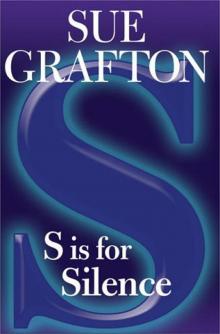 S Is for Silence
S Is for Silence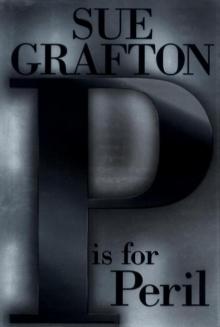 P Is for Peril
P Is for Peril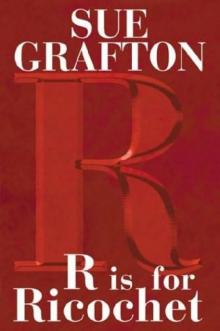 R Is for Ricochet
R Is for Ricochet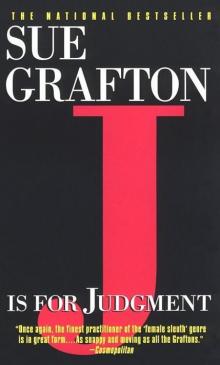 J Is for Judgment
J Is for Judgment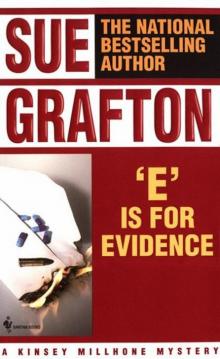 E Is for Evidence
E Is for Evidence T Is for Trespass
T Is for Trespass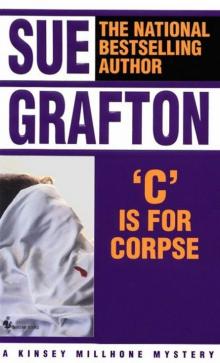 C Is for Corpse
C Is for Corpse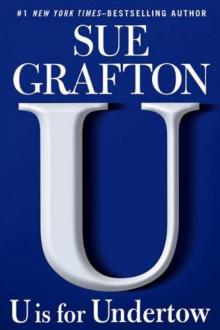 U Is for Undertow
U Is for Undertow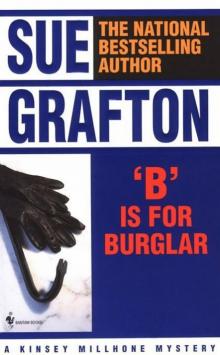 B Is for Burglar
B Is for Burglar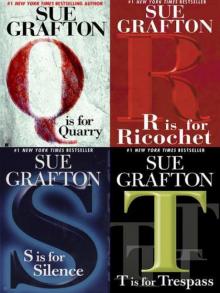 Four Sue Grafton Novels
Four Sue Grafton Novels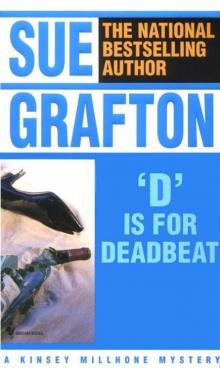 D Is for Deadbeat
D Is for Deadbeat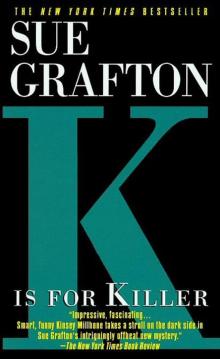 K Is for Killer
K Is for Killer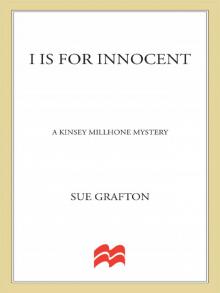 I Is for Innocent
I Is for Innocent A Is for Alibi
A Is for Alibi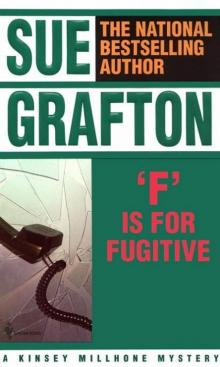 F Is for Fugitive
F Is for Fugitive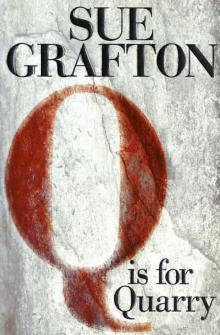 Q Is for Quarry
Q Is for Quarry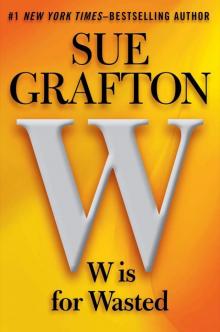 W Is for Wasted
W Is for Wasted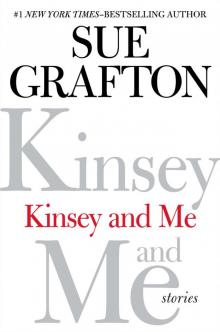 Kinsey and Me: Stories
Kinsey and Me: Stories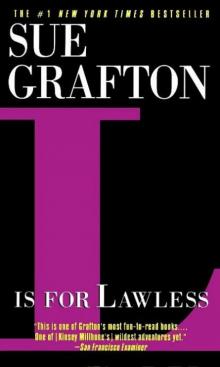 L Is for Lawless
L Is for Lawless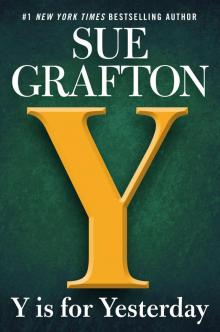 Y Is for Yesterday
Y Is for Yesterday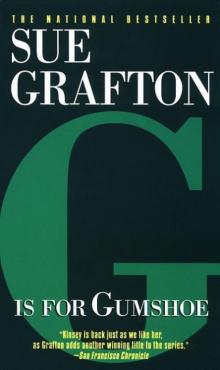 G Is for Gumshoe
G Is for Gumshoe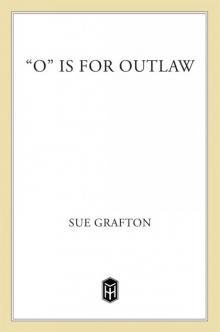 O Is for Outlaw
O Is for Outlaw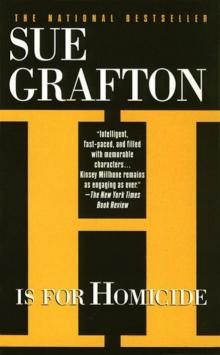 H Is for Homicide
H Is for Homicide X
X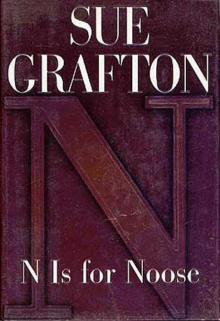 N Is for Noose
N Is for Noose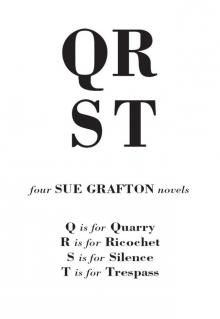 Three Complete Novels: A Is for Alibi / B Is for Burglar / C Is for Corpse
Three Complete Novels: A Is for Alibi / B Is for Burglar / C Is for Corpse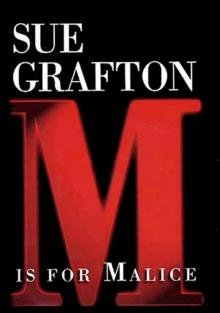 M Is for Malice
M Is for Malice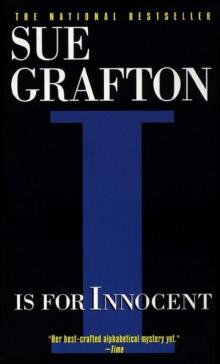 I is for INNOCENT
I is for INNOCENT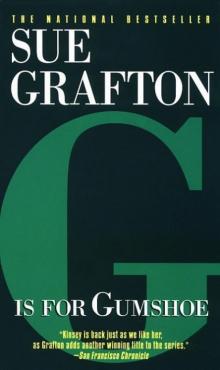 G is for GUMSHOE
G is for GUMSHOE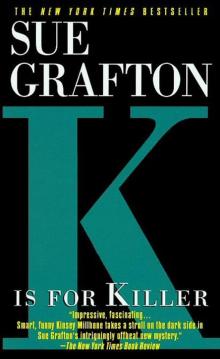 K is for KILLER
K is for KILLER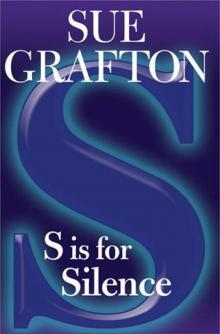 S is for SILENCE
S is for SILENCE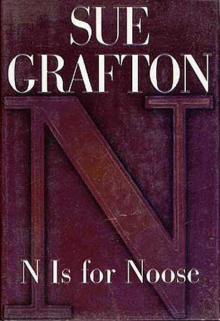 N is for NOOSE
N is for NOOSE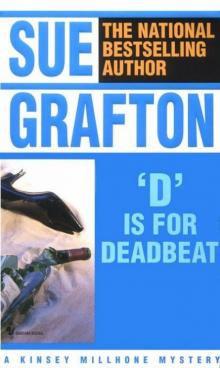 D is for DEADBEAT
D is for DEADBEAT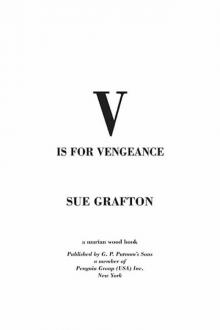 V is for Vengeance
V is for Vengeance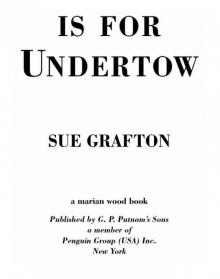 U is for Undertow
U is for Undertow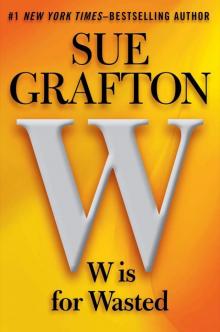 W Is for Wasted km-23
W Is for Wasted km-23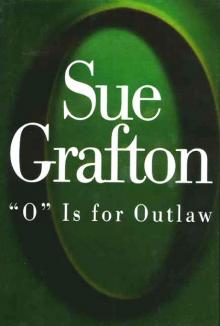 O is for OUTLAW
O is for OUTLAW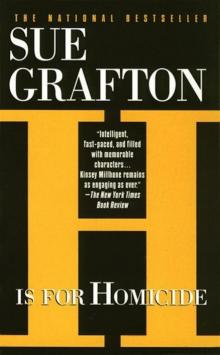 H is for HOMICIDE
H is for HOMICIDE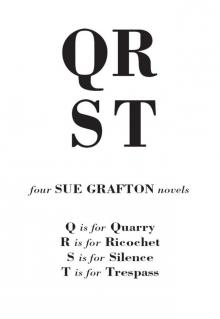 Sue Grafton Novel Collection
Sue Grafton Novel Collection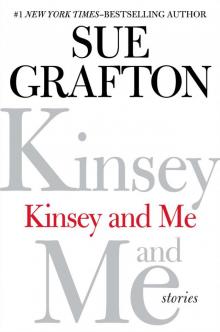 Kinsey and Me
Kinsey and Me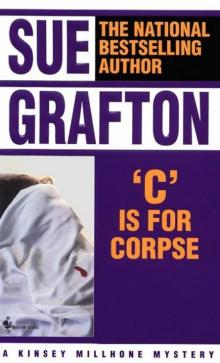 C is for CORPSE
C is for CORPSE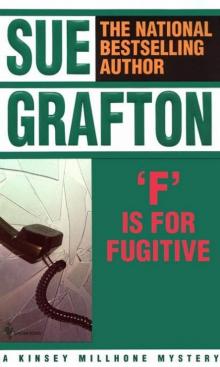 F is for FUGITIVE
F is for FUGITIVE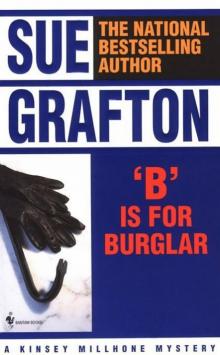 B is for BURGLAR
B is for BURGLAR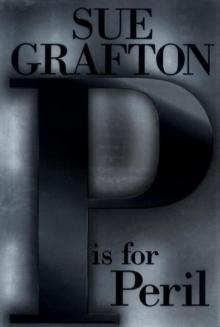 P is for PERIL
P is for PERIL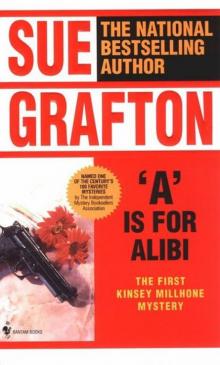 A is for ALIBI
A is for ALIBI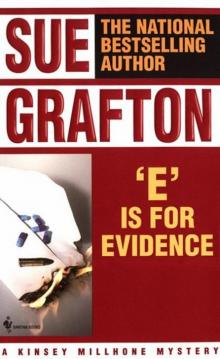 E is for EVIDENCE
E is for EVIDENCE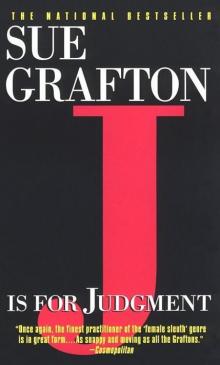 J is for JUDGMENT
J is for JUDGMENT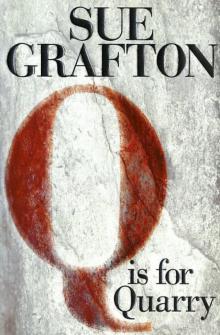 Q is for QUARRY
Q is for QUARRY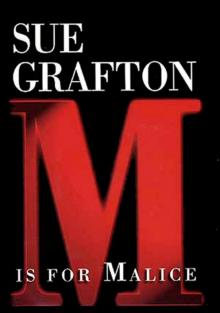 M is for MALICE
M is for MALICE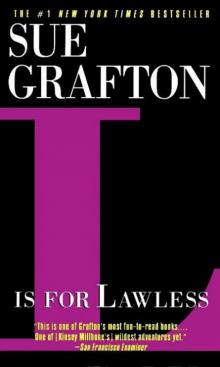 L is for LAWLESS
L is for LAWLESS